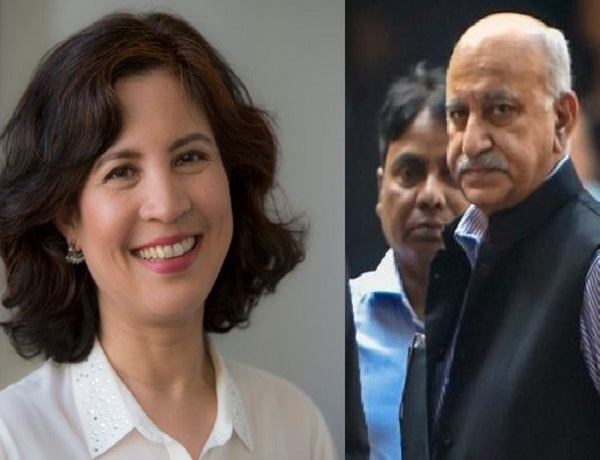Former celebrated editor MJ Akbar, who had recently resigned as the Minister of State in the External Affairs Ministry in the wake of the #MeToo controversy after he was accused of sexual harassment by as many as 20 former colleagues who worked under him, has now been accused of rape. Shillong-born American journalist Pallavi Gogoi, who has her roots in Assam, has accused Akbar of raping her 23 years ago while she was working under him at ‘The Asian Age’.
In her first-hand account that was published in ‘The Washington Post’, Pallavi claimed Akbar first sexually assaulted her in 1994.
Those before me have given me the courage to reach into the recesses of my mind and confront the monster that I escaped from decades ago. Together, our voices tell a different truth @TushitaPatel @SuparnaSharma @priyaramani @ghazalawahab
My story https://t.co/DG5dT7TEUU— Pallavi Gogoi (@pgogoi) November 1, 2018
Akbar, however, has dismissed the allegations, terming his relationship with Pallavi as consensual. Incidentally, MJ Akbar’s wife too broke her silence for the first time with news agency ANI releasing a statement of her that claimed her as saying that “Pallavi Gogoi caused unhappiness and discord in our home…I don’t know Pallavi’s reasons for telling this lie but a lie it is.”
Pallavi Gogoi, the chief business editor of the US-based National Public Radio and an American citizen now, wrote in the article that she was 22 years when she joined ‘Asian Age’.
“I was 22 years old when I went to work at the Asian Age, where the vast majority of us were women. Most of us who joined the outlet were barely out of college. We hadn’t even learned the most basic tools of journalism. Working in New Delhi under Akbar, we were star-struck. He was famous, an author of two well-regarded political books and a leading editor. In the span of about a decade, he helped launch two hugely successful publications in India: Sunday magazine and the Telegraph daily newspaper. The Asian Age, an international paper, was then his latest venture,” Pallavi wrote in her ‘Washington Post’ article.
“At 23, I became the editor of the op-ed page at the Asian Age. I would place calls to top columnists, giants of Indian politics and intellectual society, such as Jaswant Singh, Arun Shourie and Nalini Singh. It was a big responsibility at a young age.”
“But I would soon pay a very big price for doing a job I loved. My friend Tushita can still recall the moments after the first time Akbar assaulted me. It must have been late spring or summer of 1994, and I had gone into his office — his door was often closed. I went to show him the op-ed page I had created with what I thought were clever headlines. He applauded my effort and suddenly lunged to kiss me. I reeled. I emerged from the office, red-faced, confused, ashamed, destroyed,” she added in the article.
The ordeal, she wrote, didn’t end there as he made another move to kiss her in Mumbai.
“The second incident was a few months later, when I was summoned to Bombay to help launch a magazine. He called me to his room at the fancy Taj hotel, again to see the layouts. When he again came close to me to kiss me, I fought him and pushed him away. He scratched my face as I ran away, tears streaming down. That evening, I explained the scratches to a friend by telling her I had slipped and fallen at the hotel,” she continued in her article, and added: “When I got back to Delhi, Akbar was livid, and he threatened to kick me out of the job if I resisted him again. But I didn’t quit the paper.”
Pallavi says she continued with her work but accused Akbar of haping her during a reporting assignment in Jaipur.
“Soon after the Bombay incident, one story took me to a remote village a few hundred miles from Delhi to cover the appalling saga of a young couple who were hanged by members of the village because the lovers were from different castes. The assignment was to end in Jaipur. When I checked back, Akbar said I could come discuss the story in his hotel in Jaipur, far from Delhi,” she wrote, and added: “In his hotel room, even though I fought him, he was physically more powerful. He ripped off my clothes and raped me. Instead of reporting him to the police, I was filled with shame. I didn’t tell anyone about this then. Would anyone have believed me?”
Pallavi said her ordeal continued.
“…he continued to defile me sexually, verbally, emotionally. He would burst into loud rages in the newsroom if he saw me talking to male colleagues my own age. It was frightening,” she wrote.
She states that she decided to finally end the ordeal after an incident in London.
“I recall the time he worked himself into a rage in the London office because he had seen me talk in a friendly manner to a male colleague. After my colleagues left work that evening, he hit me and went on a rampage, throwing things from the desk at me — a pair of scissors, a paperweight, whatever he could get his hands on. I ran away from the office and hid in Hyde Park for an hour,” Pallavi Gogoi added in her column, and stated that it she finally quit ‘The Asian Age’ after the incident in London.
‘The Washington Post’, meanwhile, claimed when they tried to reach out to Akbar’s lawyer over Pallavi Gogoi’s column, the response was: “My client states that these [incidents and allegations] are false and expressly denied.”





